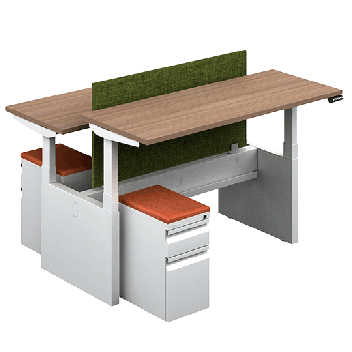Dominate the Workplace: Develop Your Soft Skills
Technical knowledge alone isn't enough in today’s highly competitive job market. Soft skills are essential for standing out and thriving in your career. Despite the transformative impact of artificial intelligence on the workplace, employers still value human skills more than ever.
.webp?width=800&height=467&name=comunicacion-laboral-efectiva-para-reducir-estres-y-fatiga%20(1).webp)
What are Soft Skills?
Soft skills are personal attributes that enable you to interact effectively and harmoniously with others in the workplace. These skills not only help you interact effectively with your colleagues but also improve productivity and the work environment.
Here are some of the most important soft skills and how you can highlight and develop them:
Most In-Demand Soft Skills in 2024
According to LinkedIn, these are the top 10 soft skills most sought after by employers:
1.Communication: Expressing ideas clearly and actively listening.
2.Customer Service: Addressing customers’ needs and concerns effectively, offering solutions, and creating positive experiences.
3. Leadership: Motivating and guiding a team towards common goals.
4. Project Management: Planning, organizing, and overseeing projects to ensure their success, coordinating resources, and maintaining communication with all parties involved.
5. Management: Identifying and solving problems efficiently, prioritizing tasks, and managing time effectively.
6. Analysis: Evaluating data, information, and situations to draw conclusions and make informed decisions.
7. Teamwork: Collaborating effectively with others.
8. Sales: Identifying sales opportunities, building relationships with potential clients, presenting products or services persuasively, and closing deals.
9. Problem Solving**: Identifying and resolving issues efficiently.
10. Research: Gathering, analyzing, and synthesizing information to gain insights and solve specific problems.
Why Are Soft Skills Important?
Soft skills are crucial for building healthy relationships, communicating effectively, and collaborating with others. Additionally, employers increasingly seek candidates who possess these skills along with technical experience. A person with soft skills can handle conflicts, adapt to changes, and work well in teams, which is vital in any work environment.
How to Highlight Your Soft Skills on Your Resume: A 5-Step Guide
Employers highly value skills like effective communication, teamwork, and problem-solving, as they are essential for success in any job. Here are five steps to help you highlight your soft skills on your resume and increase your chances of landing the job you want:
1. Identify the Necessary Skills
Carefully read the job description of the position you’re applying for. Pay attention to the keywords and phrases used to describe the skills and qualities sought in an ideal candidate. These are the soft skills you should highlight on your resume.
2. Incorporate Them in Your Objective or Summary
Your professional objective or summary is the first section a recruiter will read, so it’s crucial to mention your most relevant soft skills from the beginning. Don’t just list them; describe how these skills have helped you achieve your professional goals in the past.
3.Provide Concrete Examples
It’s not enough to claim you have certain soft skills. You need to provide concrete examples of how you’ve used these skills in previous work situations. Describe specific instances where you demonstrated skills like effective communication, problem-solving, or teamwork.
4. Highlight Them in the Skills Section
Create a specific section on your resume to list your soft skills. This will give the recruiter a clear and organized view of your most relevant skills. Be sure to use keywords and phrases that match the job description.
5. Provide Additional Evidence
If you have certifications, courses, or workshops that demonstrate your competence in certain soft skills, don’t hesitate to include them on your resume. This will add credibility to your claims and show the recruiter that you are committed to your professional development.
Remember
- Be Honest: It’s important to be honest about your soft skills. Don’t exaggerate or invent skills you don’t have, as this could negatively impact your application.
- Tailor Your Resume: Each job is different, so it’s important to tailor your resume to highlight the soft skills most relevant to the specific position you’re applying for.
- Practice Your Pitch: If you get called for an interview, it’s important to be able to talk about your soft skills clearly and concisely. Practice your pitch with a friend or family member to ensure you can communicate your skills effectively.
By following these tips, you can highlight your soft skills on your resume and increase your chances of getting the job you want.
Develop and Improve Your Soft Skills!
Developing and improving your soft skills is not only important for your professional life but also for your personal life. Here are some tips:
1. Do an Honest Self-Assessment
- Reflect on Your Strengths and Weaknesses: The first step to improving your soft skills is to have a clear understanding of your strengths and weaknesses. Spend some time reflecting on your past experiences and think about situations where you excelled in certain soft skills or struggled with them.
- Use Self-Assessment Tools: There are several online self-assessment tools that can help you identify your soft skills. These tools can provide you with a more objective perspective on your strengths and weaknesses.
2. Seek Feedback from Colleagues and Mentors
- Ask for Opinions from Trusted People: Once you have a better understanding of your own soft skills, it’s important to seek feedback from trusted people, such as colleagues, mentors, or friends. Ask them for honest feedback about your strengths and areas for improvement.
- Pay Attention to Patterns: As you receive feedback from different people, look for common patterns. This can help you identify specific areas where you need to work.
3. Set Specific Goals
-Define SMART Objectives: Once you’ve identified the areas you want to improve, set specific, measurable, achievable, relevant, and time-bound (SMART) goals. This will help you stay motivated and focused on your progress.
4. Look for Opportunities to Practice:
- Take Advantage of Opportunities in Your Work and Personal Life: Look for opportunities to practice your soft skills in your daily life. For example, you can volunteer to lead a project at work, join a club or social group, or simply be more mindful of your communication with others.
-Enroll in Courses or Workshops: There are many courses and workshops available that can help you develop and improve your soft skills. These courses can provide you with the tools and knowledge you need to achieve your goals.
5. Be Patient and Persevere
- Developing and Improving Soft Skills Takes Time and Effort: Don’t get discouraged if you don’t see immediate results. Keep practicing and learning, and eventually, you will see improvements in your skills and in your personal and professional life.
Developing soft skills takes time and constant practice. But investing in them will give you a competitive edge in your career and help you stand out as a well-rounded and valuable professional. Take advantage of learning opportunities, seek feedback, and apply these tips in your daily life. Start today! Platforms like Santander Open Academy offer free resources to help you acquire or improve your personal tools and face the current job market.
Remember, investing in your soft skills is investing in your professional and personal success. Start today!





